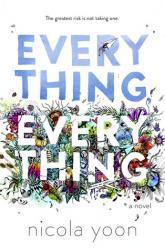
Everything Everything is about a girl named Madeline Whittier. Madeline is sick, she has been sick for a long time. Her brother and dad died when she was very young and it was only her and her mother. She was so sick that she couldn't leave her house and was practically allergic to the world. Then all of a sudden a new neighbor moved in and that changed her life. The neighbor, a boy named Ollie, moved in and they became fast friends through emailing. After awhile, Carla, Madeline's nurse, let her see Ollie as
long as he got decontaminated beforehand. Madeline was so happy till she went outside and her mom found out and she got grounded and she couldn't see or email Ollie anymore to the point where she made some decisions that questioned her health. Throughout the year she was eighteen, she found out that she was lied to and became a new person.

Everything Everything is about a girl named Madeline Whittier. Madeline is sick, she has been sick for a long time. Her brother and dad died when she was very young and it was only her and her mother. She was so sick that she couldn't leave her house and was practically allergic to the world. Then all of a sudden a new neighbor moved in and that changed her life. The neighbor, a boy named Ollie, moved in and they became fast friends through emailing. After awhile, Carla, Madeline's nurse, let her see Ollie as
long as he got decontaminated beforehand. Madeline was so happy till she went outside and her mom found out and she got grounded and she couldn't see or email Ollie anymore to the point where she made some decisions that questioned her health. Throughout the year she was eighteen, she found out that she was lied to and became a new person.
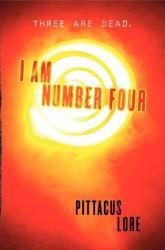
I am Number Four is about the main character John Smith. John and his caretaker Henri try to live in the world without being noticed. At the start of the book, John and Henri go from Florida to Paradise, Ohio, where John try's to stay unnoticed at another new school. John doesn't usually make friends because he moves alot but in Paradise he makes friends with a alien conspirator Sam Goode and and a pretty girl named Sarah Hart. And an enemy named Mark James.
The reason I chose this book is because its about a teenager trying not to be noticed in a world where he doesn't belong. Many events like a scare where Henri seems to be missing makes John become more aware of the world and the people it it. My favorite part about this book is when John actually becomes aware of the world and grows in many ways throughout the book. My least favorite part about the book is when John has to leave Sarah behind and go somewhere with Sam and Someone like him Six.
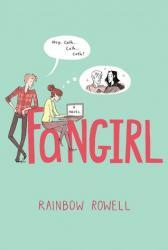
This book is about a fan girls life. The protagonist started college and is very anxious. She spends her 1st semester in her dorm room. In the second semester her life changes she has a few friends. The girl is obsessed with a book series that makes her life worth living. In the end the book ends in the best possible way.

This book is about a fan girls life. The protagonist started college and is very anxious. She spends her 1st semester in her dorm room. In the second semester her life changes she has a few friends. The girl is obsessed with a book series that makes her life worth living. In the end the book ends in the best possible way.
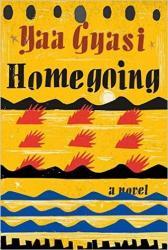
Homegoing by Yaa Gyasi follows two bloodlines, from half sisters in Ghana. Each chapter is about one descendant, switching between families somthat two chapters in a row are one generation. The book is well written and includes details that tie well into real life history or beliefs, and each chapter is in fact written in correlation with a major historical event. Through these tie-ins, the book is able to remain exciting, and each chapter could be read as a standalone short story. Each character has an important story, and is revisited in following chapters from their bloodline, either from memory or real life interactions between their children or grandchildren. In addition to the basic storytelling and history included in the book, there is also an aspect of mysticism, and values/traditions that are native to African culture, making it a solid read for increasing knowledge or understanding of Ghanan culture. For me, there are moments in the book that seem unnecessary to the general plot and sometimes vulgar, but they end up being essential in the consistency of the way the story is told. Readers are able to attach themselves to each character, story arc, anddetail, then follow them throughout the series of stories.

Homegoing by Yaa Gyasi follows two bloodlines, from half sisters in Ghana. Each chapter is about one descendant, switching between families somthat two chapters in a row are one generation. The book is well written and includes details that tie well into real life history or beliefs, and each chapter is in fact written in correlation with a major historical event. Through these tie-ins, the book is able to remain exciting, and each chapter could be read as a standalone short story. Each character has an important story, and is revisited in following chapters from their bloodline, either from memory or real life interactions between their children or grandchildren. In addition to the basic storytelling and history included in the book, there is also an aspect of mysticism, and values/traditions that are native to African culture, making it a solid read for increasing knowledge or understanding of Ghanan culture. For me, there are moments in the book that seem unnecessary to the general plot and sometimes vulgar, but they end up being essential in the consistency of the way the story is told. Readers are able to attach themselves to each character, story arc, anddetail, then follow them throughout the series of stories.

Homegoing by Yaa Gyasi follows two bloodlines, from half sisters in Ghana. Each chapter is about one descendant, switching between families somthat two chapters in a row are one generation. The book is well written and includes details that tie well into real life history or beliefs, and each chapter is in fact written in correlation with a major historical event. Through these tie-ins, the book is able to remain exciting, and each chapter could be read as a standalone short story. Each character has an important story, and is revisited in following chapters from their bloodline, either from memory or real life interactions between their children or grandchildren. In addition to the basic storytelling and history included in the book, there is also an aspect of mysticism, and values/traditions that are native to African culture, making it a solid read for increasing knowledge or understanding of Ghanan culture. For me, there are moments in the book that seem unnecessary to the general plot and sometimes vulgar, but they end up being essential in the consistency of the way the story is told. Readers are able to attach themselves to each character, story arc, anddetail, then follow them throughout the series of stories.
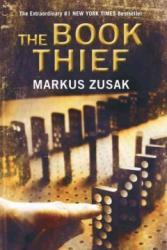
The Book Thief by Markus Zusak is my favorite book of all time. The story follows a young girl named Liesel Meminger growing up in Nazi Germany. Her love of books progresses throughout the plot, and the cast of characters she meets along the way help make the story the loveable masterpiece I know it as (personally, my favorite characters include Max Vandenburg, Rudy Steiner, and Hans Hubermann). This book is historical fiction, but I recommend it for most (if not all) readers. I typically read fantasy books, but I adore The Book Thief. The plot isn’t fast paced like adventure stories, and the events are on the ordinary side, but in my opinion the author does a brilliant job with descriptions and human connections within the book. Another reason I love this book is the use of the narrator--the way colors are described and the story is told is unique and wonderful to read. It’s a story about WWII told in a different perspective than other books we typically read at school, such as Night by Elie Wiesel or The Diary of Anne Frank. Even if you don’t particularly like the historical fiction genre, I would recommend giving this book a try. I first read it in 6th grade, but it is definitely not a story for just children. It is good for any age, and common sense media rates it for kids 13+.

The Book Thief by Markus Zusak is my favorite book of all time. The story follows a young girl named Liesel Meminger growing up in Nazi Germany. Her love of books progresses throughout the plot, and the cast of characters she meets along the way help make the story the loveable masterpiece I know it as (personally, my favorite characters include Max Vandenburg, Rudy Steiner, and Hans Hubermann). This book is historical fiction, but I recommend it for most (if not all) readers. I typically read fantasy books, but I adore The Book Thief. The plot isn’t fast paced like adventure stories, and the events are on the ordinary side, but in my opinion the author does a brilliant job with descriptions and human connections within the book. Another reason I love this book is the use of the narrator--the way colors are described and the story is told is unique and wonderful to read. It’s a story about WWII told in a different perspective than other books we typically read at school, such as Night by Elie Wiesel or The Diary of Anne Frank. Even if you don’t particularly like the historical fiction genre, I would recommend giving this book a try. I first read it in 6th grade, but it is definitely not a story for just children. It is good for any age, and common sense media rates it for kids 13+.
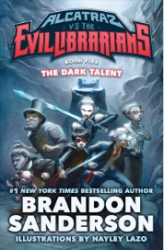
There’s foreshadowing; then there are five books of foreshadowing. In The Dark Talent, Brandon Sanderson starts wrapping up this amusing middle-grade series by finally reaching the part of the story that was alluded to so many books ago. While this could easily be the final book in the series, I believe there’s enough left unconcluded that another volume should be written to wrap these remaining subplots up into satisfying conclusions. By this point in the series, the Alcatraz formula has been thoroughly explored, and it almost seems to be running on autopilot*. Granted, this was after four books of character and plot development, but there’s still an amount of “been there seen that” here.
I am always in awe of Brandon Sanderson’s world-building, and the Alcatraz series is no exception. Breaking into the Library of Congress was such a natural extension of the “Librarian” motif that I’m a little surprised it took this long to get here. The magic system with lenses and glass is also well thought out and makes sense with each ridiculous use of its numerous lenses (embarrassment = explosions? Why not!).
Once again, I have to remind myself that books like The Dark Talent are geared toward younger minds. Sure, the plot twist/reveal helped drive the story forward, but it was so telegraphed that I had it all figured out as soon as this individual character was introduced. Still, for younger readers, this revelation may come as a surprise. And while the main character’s writing style is constantly on the caricature side of the spectrum, we do get to see some brief moments of vulnerability in the main players. Even if the main character can get a little grating at times, the first person narrative device works well for this middle-grade fantasy.
A fulfillment of four books of foreshadowing, I give The Dark Talent 4.0 stars out of 5.
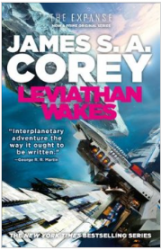
For years, my co-worker has been suggesting that I read the Expanse series of books. Before I finally got around to the audiobook for Leviathan Wakes, I took a slight shortcut and watched the television series on Amazon. This came in handy because I was able to pick up this book and immediately be able to visualize what was happening and who the characters were. Sure, the actors cast in the show are slightly different from their literary counterparts. Still, overall there was a lot in this book that I had already experienced with the television show.
I will applaud this book for being a hard science fiction story, but not shoving the calculations in the reader’s face. Sure, The Martian did an excellent job of explaining all the scientific challenges of interplanetary travel. However, Leviathan Wakes took this a step further and created a universe that’s still controlled by the same physical laws we encounter in the real world. Unless you know what you’re looking for, you’d never realize that the little ways to make life livable in outer space would manifest in the forms presented in this series. Basically—to quote the title of a Heinlein book—Gravity is a Harsh Mistress.
And while the television show had lots of different plotlines to follow through its four seasons, I do like how Leviathan Wakes focused on just two main characters and the discovery of the Protomolecule. Although—even though both characters came from different backgrounds—I would have expected their reactions to situations would have been more drastically different than they were. Still, even if both Miller and Holden felt like very similar characters, they were both written well enough that it was an entertaining ride, nonetheless.
A perfect blending of story and hard sci-fi, I give Leviathan Wakes 4.0 stars out of 5.

For years, my co-worker has been suggesting that I read the Expanse series of books. Before I finally got around to the audiobook for Leviathan Wakes, I took a slight shortcut and watched the television series on Amazon. This came in handy because I was able to pick up this book and immediately be able to visualize what was happening and who the characters were. Sure, the actors cast in the show are slightly different from their literary counterparts. Still, overall there was a lot in this book that I had already experienced with the television show.
I will applaud this book for being a hard science fiction story, but not shoving the calculations in the reader’s face. Sure, The Martian did an excellent job of explaining all the scientific challenges of interplanetary travel. However, Leviathan Wakes took this a step further and created a universe that’s still controlled by the same physical laws we encounter in the real world. Unless you know what you’re looking for, you’d never realize that the little ways to make life livable in outer space would manifest in the forms presented in this series. Basically—to quote the title of a Heinlein book—Gravity is a Harsh Mistress.
And while the television show had lots of different plotlines to follow through its four seasons, I do like how Leviathan Wakes focused on just two main characters and the discovery of the Protomolecule. Although—even though both characters came from different backgrounds—I would have expected their reactions to situations would have been more drastically different than they were. Still, even if both Miller and Holden felt like very similar characters, they were both written well enough that it was an entertaining ride, nonetheless.
A perfect blending of story and hard sci-fi, I give Leviathan Wakes 4.0 stars out of 5.

For years, my co-worker has been suggesting that I read the Expanse series of books. Before I finally got around to the audiobook for Leviathan Wakes, I took a slight shortcut and watched the television series on Amazon. This came in handy because I was able to pick up this book and immediately be able to visualize what was happening and who the characters were. Sure, the actors cast in the show are slightly different from their literary counterparts. Still, overall there was a lot in this book that I had already experienced with the television show.
I will applaud this book for being a hard science fiction story, but not shoving the calculations in the reader’s face. Sure, The Martian did an excellent job of explaining all the scientific challenges of interplanetary travel. However, Leviathan Wakes took this a step further and created a universe that’s still controlled by the same physical laws we encounter in the real world. Unless you know what you’re looking for, you’d never realize that the little ways to make life livable in outer space would manifest in the forms presented in this series. Basically—to quote the title of a Heinlein book—Gravity is a Harsh Mistress.
And while the television show had lots of different plotlines to follow through its four seasons, I do like how Leviathan Wakes focused on just two main characters and the discovery of the Protomolecule. Although—even though both characters came from different backgrounds—I would have expected their reactions to situations would have been more drastically different than they were. Still, even if both Miller and Holden felt like very similar characters, they were both written well enough that it was an entertaining ride, nonetheless.
A perfect blending of story and hard sci-fi, I give Leviathan Wakes 4.0 stars out of 5.
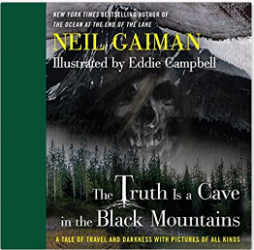
As I’d realized in previous works of Neil Gaiman’s that I’ve read, he excels at (at least) two things: short stories and fairy tales. One could argue that the latter is a subset of the former, but longer works like Stardust cause me to separate the distinction. Perhaps this book was made all the more magical by its audiobook production. Not only did the author himself read it, but it was accompanied with some great atmospheric music to enhance the mood produced by Gaiman’s words. I missed the illustrations this book sports, but I think the words can speak for themselves.
In terms of a fairy tale, The Truth is a Cave in the Black Mountains manages to contain the usual flare of morality and truth against a backdrop of riches and mysterious wonder. I’m almost surprised there aren’t more authors writing modern fairy tales as Gaiman has since there is a precise formula here that Gaiman has consistently used to create these fantastical narratives. After all, most fairy tales are trying to teach something intrinsically human, and this one touches on the oft-repeated moral of greed versus the consequences of obtaining wealth.
Of course, much like Gaiman’s other “fairy tale” works, this story is intended for adults. Sure, traditional fairy tales are gruesome and are used to scare children into submission. Regardless, the lesson contained in this story is something most adults need to hear. We all love the idea of the “get rich quick” scheme, but there are often secondary effects that we overlook when we head out to seek our fortunes. Perhaps if the more adult aspects were toned down a little, it could be used to teach children about these moral pitfalls before they encounter them, instead of after the fact.
Another superb adult fairy tale, I give The Truth is a Cave in the Black Mountains 4.0 stars out of 5.
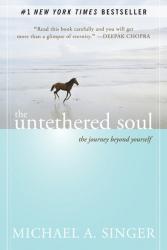
Wow...reading this book will take you on a spiritual journey unlike any other. If the idea of becoming more mentally and emotionally free, mindful, concious, happy and self-actualized interest you, then give this #1 New York Times Bestseller a read today!
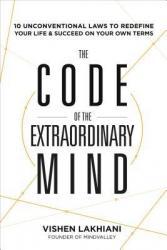
Written by the founder of the successful online learning platform MindValley, this book will change your life, or at least spark a bit of self-reflection. Vishen takes the reader through 10 life-redefining laws leading to success, which are then divided into 4 parts. Part I explains how we have each been shaped, for better and for worse, by our culture and childhood. In Part II, the reader is challenged to either accept or modify what was brought to the surface in Part I. Part III is entitle "Recoding Yourself" and delves into mindfulness, discipline, "bending reality," goal setting to lead to lasting fulfillment every time and other compelling topics. Finally, Part IV provokes the reader to find their quest, and change the world. This is one of the most worthwhile self help books I have ever read and I recommend it to anyone wanting to change their life, thinking patterns, or habits for the better.
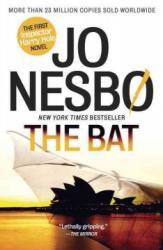
While this is the first book (1997) in the wildly popular Harry Hole series, it was actually the fourth translated into English. After reading it, I had assumed it was the first book and the publisher had been cheap -- poor translation and editing --- but hoped to piggy back on Stieg Larsson's success in the U.S.. I began reading the series with Harry Hole No. 9, The Phantom (2011) as a Why Not? purchase during a lengthy flight delay. I am thankful I did not start with The Bat or I might have missed out on one of my favorite Nordic Noir authors and a compelling character in Hole (prononced HO-Lay in Norwegian). The Bat gets off to an uncharacteristically slow start but later delivers the gritty thriller action Nesbo fans enjoy in later works. In the novel, the troubled police detective travels to Australia to investigate the murder of a Norwegian, then discovers and solves a series of homicides while running amok of local authorities eager to send him back to Oslo. If you are a series reader who wants to start at the beginning, then read The Bat. But don't feel bad if you start with Cockroaches (1998) or even The Redbreast (2000), the third Hole book, which won The Glass Key award for best Nordic crime novel.
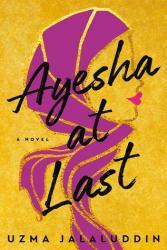
Definitely an amazing book. It puts such a difficult topic into beautiful words that pull at the strings of the readers heart. The way the main characters conflicting situation throughout the story unfolds is very surprising. The author places the reader in the main characters shoes and makes it feel as if it is the reader who is going through it. I wish there was a second book that really grasps the life after.
Reviewer Grade: 11th
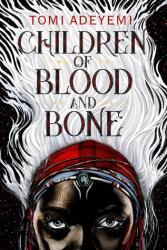
Zelie lives in Orisha, a place where magic used to live in abundance, until one night the king kills all the magi (the people who can control the magic), except for the children magi who have never used magic before. Zelie now finds herself trying to help a rogue princess get away, but that quickly turns to bringing magic back. With the help of her brother, the princess, and many others, Zelie now has a chance to bring magic back. I thought that the plot was very interesting and suspenseful. I did feel as if there were places in the book that could have been left out or shortened because there is a lot of detail that can become confusing. The book is the first part in a series, and the author did leave the book on a sort of cliffhanger making me want to read more. Reviewer Grade: 10



 Ruth Holley Library will be temporarily closed for approximately one week starting Mon., Dec. 2 to complete roof repairs.
Ruth Holley Library will be temporarily closed for approximately one week starting Mon., Dec. 2 to complete roof repairs.